|
War of 1812
Timeline: 1812
Go here for the
 War of 1812 in a Nutshell
War of 1812 in a Nutshell
If
these timelines of the War of 1812 are too detailed,
check the
 War
of 1812 - Key Events,
which are a summary of the years
1812-1815. War
of 1812 - Key Events,
which are a summary of the years
1812-1815.
January 25, 1812
 Josiah Quincy
delivers his speech on
Josiah Quincy
delivers his speech on
 Maritime Protection before
Congress, in which he asks for "maritime defense of our maritime
rights."
Maritime Protection before
Congress, in which he asks for "maritime defense of our maritime
rights."
February 8, 1812
 U.S. President James Madison
purchases documents from a British spy,
John Henry, for $50,000. These are the
John Henry
Letters, and it turns out that they are not much more than hot air
and John Henry not much of a spy. However,
for those Americans who didn't like the British before, now like
them even less.
U.S. President James Madison
purchases documents from a British spy,
John Henry, for $50,000. These are the
John Henry
Letters, and it turns out that they are not much more than hot air
and John Henry not much of a spy. However,
for those Americans who didn't like the British before, now like
them even less.
March 9, 1812
The
 John Henry Letters
are released.
John Henry Letters
are released.
April 4, 1812
The U.S. signs another embargo. This one is for 90 days.
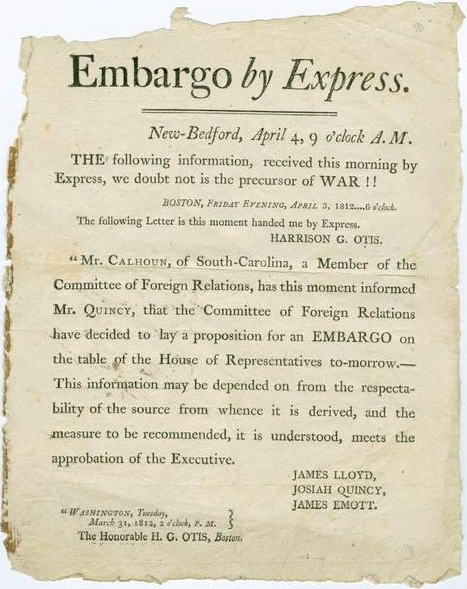
Embargo
"Believing war to be only days away, President Madison declared
an embargo on April 4, 1812, in an effort to keep American ships in
port and out of the hands of the British. This Massachusetts
broadside announces the unpopular legislation."
Lilly Library / Indiana
University
April 8, 1812
Congress declares Louisiana
(Orleans Territory) one of the United States of America,
effective April 30, 1812.
April 14, 1812
The United States add a non-exportation law for the duration of the
90 day embargo of April 4, 1812.
Also on April 14, 1812:
After the declaration on April 8 with regards to Louisiana, Congress
adds to the state of Louisiana the Florida
Parishes, which is the land between the Mississippi and
Pearl River, the area that had been briefly the
 Republic of West Florida in
1810, thanks to the
Republic of West Florida in
1810, thanks to the
 West Florida Revolt.
West Florida Revolt.
April 30, 1812
Louisiana is admitted to the
Union.
May 11, 1812
Assassination of British Prime Minister
Spencer Perceval (Tory) in the lobby of the House of Commons,
London, by
John Bellingham, who had a
personal grudge against the British government, and pistols.
Bellingham shot Perceval in the chest and Perceval died almost
immediately.
Bellingham will be tried on May 15,
and executed on May 18, 1812.
On
 June 8, 1812,
Robert Banks Jenkinson, 2nd Earl of
Liverpool, will become the new British prime minister.
June 8, 1812,
Robert Banks Jenkinson, 2nd Earl of
Liverpool, will become the new British prime minister.
May 14, 1812
Congress declares the middle
part of
 West Florida, from the Pearl
River to the Perdido River, as officially annexed, and adds it to
the Territory of Mississippi.
West Florida, from the Pearl
River to the Perdido River, as officially annexed, and adds it to
the Territory of Mississippi.
May 15, 1812
Trial of John Bellingham, assassin of Spencer Perceval. He is found
guilty of murder.
May 18, 1812
Execution of John Bellingham, assassin of Spencer Perceval.
May 22, 1812
The eagerly expected U.S Sloop Hornet (20 guns) arrives from
Europe but didn't bring news of British concessions.
June 1, 1812
 President Madison
sends a secret war message to Congress.
President Madison
sends a secret war message to Congress.
June 4, 1812
The U.S. House of Representatives passes the war bill with 79 to 49
votes.
June 8, 1812
After the assassination of British prime minister Spencer Perceval
on
 May 11, 1812,
Robert Banks Jenkinson, 2nd Earl of
Liverpool (Tory), becomes his successor on this day.
Liverpool will remain in this position for a solid 15 years, until
February 17, 1827, to be exact.
May 11, 1812,
Robert Banks Jenkinson, 2nd Earl of
Liverpool (Tory), becomes his successor on this day.
Liverpool will remain in this position for a solid 15 years, until
February 17, 1827, to be exact.
June 16, 1812
British foreign secretary Lord Castlereagh announces in Parliament
that the Orders-in-Council would be suspended IF the United States
dropped its ban on British imports. On June 24, 1812 they will be
suspended even without a reply from the U.S.
June 17, 1812
The U.S. Senate passes the war bill with 19 to 13 votes.
June 18, 1812
 President Madison
signs the war bill into law.
The U.S. declares war
against Great Britain.
President Madison
signs the war bill into law.
The U.S. declares war
against Great Britain.
The War of 1812 begins.
June 20, 1812
A clip from today's Baltimore Federal Republican
newspaper:
We mean to represent, in as strong colors as
we are capable, that the war is unnecessary,
inexpedient, and entered into from partial,
personal, and, as we believe, motives
bearing upon their front marks of
undisguised foreign influence which cannot
be mistaken.
June 22, 1812
The Baltimore Riots begin. They will last
into August.
June 24, 1812
The new British Prime Minister Liverpool
repeals the Orders-in-Council. This move had
been announced by Castlereagh on June 16,
1812, provided the U.S. would drop the ban
on British imports. The U.S. had not
replied, but today, the
Orders-in-Council were repealed anyway.
Driving force
behind the revocation of the
Orders-in-Council was
Henry Peter Brougham, later
lord chancellor, who saw these measures as a
threat to both, British trade and peace with
the U.S.
Unfortunately,
it was too late. Arguably, the war wouldn't
have been declared if the orders in council
would have been repealed earlier, or if news
of their cancellation could have been
communicated faster.
Meanwhile in Europe:
 Napoleon is on his way to
Napoleon is on his way to
 invade
Russia. invade
Russia.
June 29, 1812
Thomas Jefferson in a letter to James
Madison:
To continue the war
popular, two things are necessary mainly, 1. To stop Indian
barbarities. The conquest of Canada will do this. 2. To
furnish markets for our produce, say indeed for our flour,
for tobacco is already given up, and seemingly without
reluctance.
The Thomas Jefferson Papers,
Library of Congress
July 5, 1812
U.S. General William Hull and 2,000
troops reach Detroit.
July 12, 1812
Invasion of Canada: U.S. General William
Hull crosses the Detroit River into
British territory. His goal is to attack
Fort Amherstburg (also called Fort
Malden.)
July 16, 1812
Captain Charles Roberts, British
commander of Fort St. Joseph, gathers
his 45 men, 180 Canadians, around 300
Indians, and makes for Fort Mackinac
(also called Fort Michilimackinac.)
General Brock has given him permission
to attack the Americans there, who, by
the way, still haven't heard the news of
the war declaration.
July 17, 1812
At 10 a.m., the U.S. garrison at Fort
Michilimackinac (Fort Mackinac - 54 to
61 troops), under
Lt. Porter Hanks, has to
deal with a British request to
surrender. Outnumbered, Hanks has no
alternative. He submits to the British,
led by Roberts, by noon.
For Hanks personally it will get worse.
He
will be defeated by a British cannon
ball on August 17, 1812.
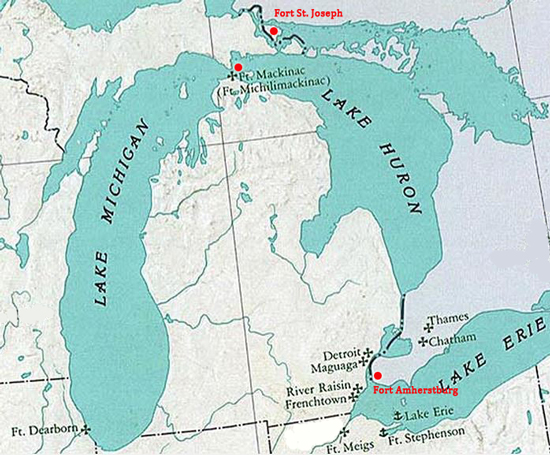
Map Location of Fort St. Joseph,
Fort Michilimackinac (also called Fort Mackinac),
and Fort Amherstburg (also called Fort
Malden)
Click to enlarge
August 5, 1812
Battle of Brownstown.
British victory. U.S. Major Thomas Van Horne and about
150 to 200 troops leave Detroit
and run into an ambush just before
Brownstown. A small band of Indians, led
by Tecumseh, kill 17 U.S. troops, leave
several wounded, and capture Van Horne's
mail, which they forward to the British
at Fort Malden.
Van Horne
and his men return to Detroit. They were
sent by General Hull to meet around 200
militia that came from Ohio with
supplies for Hull and stopped at the
Raisin River.
After this
incident, Hull withdraws across the
Detroit River to Detroit. He will send a second
unit to secure supply lines on August 9, 1812.
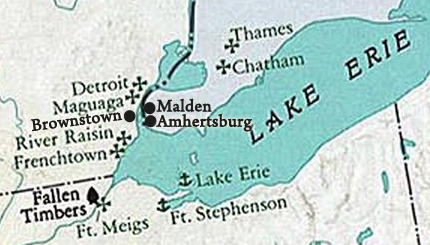
Battle of Brownstown - August 5, 1812 -
Map
August 9, 1812
Battle of Monguagon
(Maguaga), today's
Trenton, Michigan. U.S. victory. A second U.S.
detachment sent by Hull, this time 600
men led by Lt. Col. James Miller, to
connect with his supplies gets attacked
at the abandoned Indian town Maguaga (Monguagon)
just outside Detroit. Around 350 to 400
British and Indian troops are led by
Adam Muir and Tecumseh. The Americans
win this battle and withdraw to Fort
Detroit.
August 10, 1812
In Halifax, U.S. major general Henry
Dearborn and Canada governor-general Sir
George Prevost agree to an armistice.
U.S. President Madison will annul this
agreement on September 8, 1812, because
the issue of
 impressment has still not
been taken care of.
impressment has still not
been taken care of.
August 13, 1812
Brock reaches Amherstburg, Ontario.
One of
these August days,
Brock and Tecumseh meet here at Amherstburg.
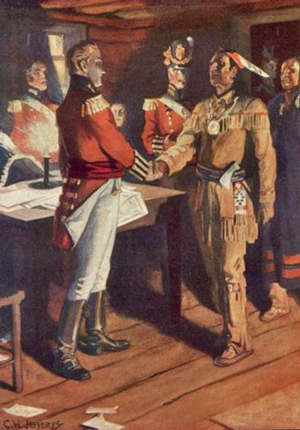
The Meeting of Brock and Tecumseh, 1812
C.W.
Jefferys
Library & Archives Canada
August 15, 1812
Led by Major General Isaac Brock,
the British and their Native American
allies, led by Tecumseh, surround Fort Detroit, capital of Michigan
Territory, and start bombardment.
Also on
August 15, 1812: Fort Dearborn
evacuated. Fort
Dearborn Massacre.
August 16, 1812
U.S. surrender
of Detroit, capital of
Michigan Territory. British artillery
fire started again early this morning.
Hull surrenders
Detroit to General Brock. The British
take 2,500 American regulars prisoners
of war.
For this victory, Brock will
become a Knight of the Order of the
Bath. Hull, on the other hand, will be
court-martialed, convicted, sentenced to
death, and pardoned by President James
Madison. Detroit will remain in British
hands until September 10, 1813.
Thus ends
this first U.S. attempt to invade Canada.
August 19, 1812
USS Constitution under Capt.
Isaac Hull, vs. HMS Guerriere
under Capt. James R. Dacres. The
Constitution wins.
September 8, 1812
President Madison invalidates the
cease-fire that was agreed upon by
Dearborn and Prevost on August 9, 1812.
September 17, 1812
 Tippecanoe
veteran William
Henry Harrison becomes major
general of all military forces in the
Northwest.
Tippecanoe
veteran William
Henry Harrison becomes major
general of all military forces in the
Northwest.
September 21, 1812
Russia's foreign minister
Count Nicholas
Romanzoff informs the U.S.
minister to St. Petersburg
 John Quincy
Adams that
Czar Alexander
I is eager to unite all
French enemies and offers mediation
between Great Britain and the United
States. If successful, this would allow
Britain to focus entirely on defeating
Russia's main enemy, Napoleon.
John Quincy
Adams that
Czar Alexander
I is eager to unite all
French enemies and offers mediation
between Great Britain and the United
States. If successful, this would allow
Britain to focus entirely on defeating
Russia's main enemy, Napoleon.
U.S.
President Madison will accept this
mediation offer. Britain will ignore it,
but will offer in its stead direct
negotiations with the Americans.
October 13, 1812
Battle of Queenston
(Queenstown) Heights, Upper Canada.
British victory but Sir Isaac
Brock is mortally wounded. This battle
concludes the second U.S. attempt to
invade Canada.
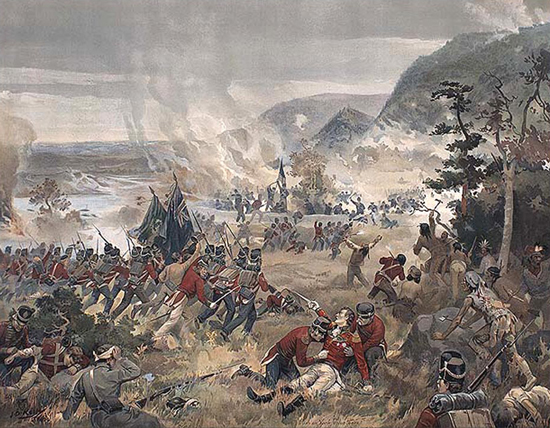
Battle of Queenston Heights - October
13th, 1812
John David Kelly
Library Archives Canada
October 18, 1812
USS Wasp vs. HMS Frolic.
U.S. victory.
October 25, 1812
USS United States vs. HMS Macedonian. The
Macedonian surrenders after 90 minutes. The British suffer 36
dead and 68 wounded. The Americans suffer 7 dead and 5 wounded.
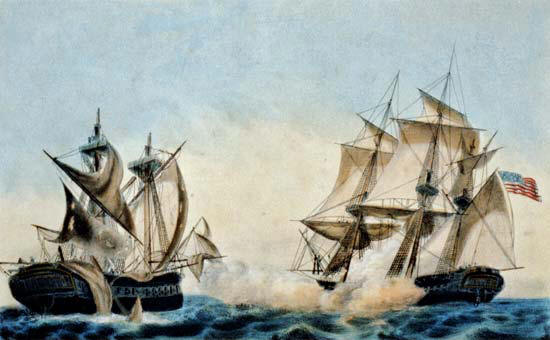
U.S. frigate United States capturing the British
frigate Macedonian
Color lithograph by Currier & Ives
Library of Congress
November 20, 1812
First Battle of Lacolle Mill,
also spelled La Colle Mill. Draw. U.S. major general Dearborn and
his men retreat to Plattsburgh (Plattsburg.) This concludes the
third U.S. invasion attempt of Canada.
The Second Battle of Lacolle Mill
will take place on March 30, 1814.
December 24, 1812
Joel Barlow, U.S.
Minister to France, dies in Poland of pneumonia. He was en route to
Wilna, Lithuania, to meet with Napoleon, who himself had invited him
there for negotiations at his winter headquarters.
December 29, 1812
USS Constitution under Commodore William Bainbridge
vs. HMS Java under Henry Lambert. This naval battle takes
place off the coast of Brazil. The Constitution wins. Captain
Lambert receives a musket shot in his chest and will die on January
4, 1813.
More History
|